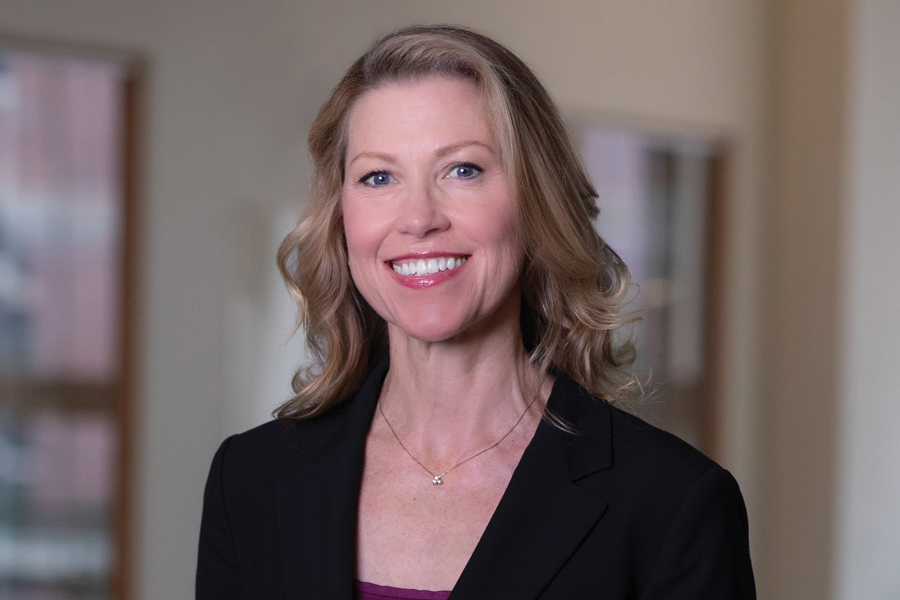Social Distortion
Distinguished Research Professor Pamela Keel is a leader in the field of eating disorders research

Sharing selfies from a beach vacation on Instagram can start out feeling like a fun treat but the activity — which invites comments on everything from the sunset to their body — can leave a person wishing they’d logged off instead.
The research explains why: A 2020 study in the International Journal of Eating Disorders revealed a “consistent and direct” link between posting photos to social media and experiencing negative thoughts about weight and shape, urges to exercise and restrict food intake, and increased anxiety.
For the researcher behind that study, Florida State University Distinguished Research Professor Pamela Keel, these findings are among the brushstrokes in her life’s work of painting a clearer picture of eating disorders — serious psychiatric illnesses with a mortality rate second only to opiate addiction.
Keel, who hails from North Carolina, first took an elective course on eating disorders as a sophomore anthropology major at Harvard University.
“I was struck by the severity and prevalence of eating disorders and by how little was known about why they developed or how to treat them,” she said.
After graduating summa cum laude, Keel transitioned to clinical psychology and earned her Ph.D. from the University of Minnesota in 1998. She completed an internship at Duke University Medical Center before spending the first decade of her career conducting research as faculty at both Harvard and the University of Iowa.
Keel joined FSU’s Clinical Psychology Program in 2008 as the program was building upon research strengths in the FSU Program in Neuroscience on the biological bases of dysregulated behavior. Since then, she has received multiple grants from the National Institutes of Health for her continued research on the nosology, biology, epidemiology, and longitudinal study of bulimic syndromes, which can include periods of binging and purging behavior.
“One of my current projects examines how biological consequences of weight loss contribute to problems controlling food intake and excessive eating — factors that could explain why it is difficult for people to maintain weight loss and contribute to the severity and maintenance of binge eating,” Keel said. “Another examines eating disorders and associated risk factors in women and men in cohorts recruited in 1982, 1992, 2002, and 2012, and follows each cohort every 10 years. This project is providing the first picture of trajectory and predictors of eating disorders across adult development in women and men from different generations including baby boomers, Generation X and millennials.”
In 2002, Keel was the first to identify and characterize purging disorder — when individuals vomit or misuse laxatives or other medications after normal food intake to control weight or shape. The disorder affects more than two million females and nearly half-a-million males in the U.S. over their lifetime and is now detailed in the the American Psychiatric Association’s Diagnostic and Statistical Manual of Mental Disorders, the professional reference on mental health and brain-related conditions guiding all research and clinical care in the U.S.
“Having the opportunity to advance science — to identify the next question that should be answered, secure funding to conduct research, get that answer, and share new information that no one had before — is an incredible privilege,” Keel said.
Alongside research, Keel is dedicated to mentorship. In her lab, the Eating Behaviors Research Clinic at FSU, students conduct their own translational research on eating disorders, including biological and psychological factors that contribute to binge eating and purging behaviors, and cultural factors that influence eating disorders and body image.
Clinical psychology graduate student Alejandra Medina Fernandez began following Keel’s research as an undergraduate and jumped at the opportunity to take part in research for the NIH-funded longitudinal study.
“The lab environment is highly collaborative and supportive, and working alongside other graduate students and research assistants has enriched my learning experience,” Medina Fernandez said. “I deeply value Dr. Keel’s commitment to her student’s professional development. She genuinely wants us to succeed, and this is evident in every discussion and interaction we have.”
Keel, a fellow of the Academy for Eating Disorders, Association for Psychological Science, and American Psychological Association, has served as president of both the Eating Disorders Research Society and Academy for Eating Disorders. She has also received several awards for mentorship.
“Dr. Keel is a world-renowned expert on eating disorders and her knowledge on this topic is vast; thus, she is able to really help students think critically and design studies to increase their significance and impact,” said Lindsay Bodell, a 2015 alumna of Keel’s lab who leads her own nationally funded eating disorders research and mentors doctoral students as an assistant professor at Western University in London, Ontario, Canada. “Her passion and dedication to her mentees is truly admirable, and I am very thankful to have been able to learn from the best."
